With all the goings on, it was quite a while before I was able to have that quiet communion with my own wife and family which is the traditionally most cherished reward for the sailor home from a long voyage. There were a hundred things to talk to her and the children about, and a number which had to wait until the youngsters had said their prayers and gone to sleep.
“Sounds to me,” I said, when we were at last alone, “that you make out better when I’m not here than when I am.”
Ingrid sighed and put her head on my shoulder. “You’d better not put me to another test for a while,” she said. “The children kept me pretty busy, and I got quite a few calls toward the end from some of die wives who were getting rather anxious…. The worst time was when Admiral Rickover called on the telephone.”
“What’s this?” I asked. “Nobody told me about that.”
“Well, I’ve not had a chance to until now, sweetie. I had a party for all the officers’ wives, and right in the middle of it the phone rang. It was long distance. So I said yes, this was Mrs. Beach on the phone, and then a voice said, This is Admiral Rickover. I want you to know privately that your husband is all right. Everything is fine. Don’t worry about him.’
“I must have let out a yelp or something, and I said, ‘That’s wonderful!’ and I could hear all the conversation in the living room suddenly stop dead. Everybody was listening, and everybody was hoping it was some kind of news about the ship.
“I thanked the Admiral, and he said good-bye and hung up. Then I remembered that in the past you had cautioned me against passing on information from calls such as this, and I had missed my chance to ask the Admiral if it was all right to tell the other wives. You said I could never know what might be behind the call, so I was never to let anyone even know that I had been called.
“There wasn’t a word I could say, but still I had to go back into the living room and face all those girls. They all just looked at me, and I thought fast and said, ‘That was my father’s doctor calling from Washington, where he’s had to come from California for a meeting, and he said that Father has been much better recently.’ I really felt terrible, lying to them like that. They all looked so dreadfully disappointed, and I wanted so much to tell them.”
I hugged her. “Good girl,” I said. “It was a lot tougher on you than on them. Anything else happen?”
She chuckled. “You had said that you didn’t know when you’d be able to get mail, so I didn’t write this time, except a little while ago, when I thought maybe I should have at least one letter in the mail for you just in case—did you get it, by the way?”
I shook my head.
“Well, I suppose it will catch up to you here at home. Anyway, one of your crew didn’t get the word to his wife. A couple of weeks ago, this girl called up, and she was nearly in tears. She had written seventeen letters to her husband, and he hadn’t answered a single one!”
“Why did she call you?” I asked. “We had put out the dope that anyone with a problem should call up the Squadron….”
“I’m glad she did, of course,” Ingrid interrupted. “Women understand these things better than men do. She knew I couldn’t write the letters for her husband. All she wanted was some womanly comfort. Besides, I told them all to call up if they felt like it.”
“You what? How did you do that?”
Ingrid smiled. “I forgot that my letter never reached you. It tells about it. I gave a coffee for all of them—it was a lovely warm day, and we had it outside, and that’s when I told them. Mrs. Poole came, too, and she never said a word about her husband being home.”
“You had 183 women, here?” My voice must have had an incredulous tinge.
“All your crew isn’t married, silly! Besides, some couldn’t come. But the garden is big enough, and all the officers’ wives helped.”
Ingrid sighed again. “They were all extremely nice. The only bad time was just before they came, when the telephone operator got me all excited about a long-distance call coming in, and I waited around thinking it must be about your arrival at last. But when the call finally came through, it was just a polite girl’s voice saying she was sorry she couldn’t come.”
We had been home for two days, when all at once I had occasion to recall the intuitive warning I had ignored when we designed and ordered our commemorative plaque. Lieutenant John Laboon, Chaplain Corps—a 1943 Naval Academy graduate who had resigned to enter the Jesuit priesthood after the war and had subsequently re-entered the Service as a Chaplain—was responsible. This onetime All-American lacrosse player and decorated submarine combat veteran, now the Catholic Chaplain for our nuclear submarine unit in New London, had come aboard to see if there were anything he could do for us. Over a cup of coffee, he confessed that although he could translate most of the words in our plaque’s Latin inscription, one of them was too much for him.
“What word?” I asked, my stomach experiencing a precipitant sinking feeling.
“Sactum,” said Laboon. “If it were ‘Factum,’ now, the phrase would literally mean ‘It is again a fact.’ But I don’t know the word ‘Sactum.’ ”
Hasty investigation restored Father Laboon’s faith in his preordainment schooling. There simply was no such word as “Sactum”! It turned out that in receiving and reading back the Latin inscription over the telephone, the letter “F” in the word “Factum” had been erroneously taken down as “S,” and the plaque as delivered to the US ambassador had therefore contained a misspelled word!
The hopelessness of the situation was enough to make one despair, but there was one thing we could do: we could get a new plaque—with the word “FACTUM” spelled correctly—over to Spain immediately; even though the original one might have contained an error, at least all posterity would not have the opportunity to criticize America’s lack of erudition.
So ran my thoughts on that black Friday, the thirteenth of May, as Triton went to work. A new plaque was cast forthwith. It was still cooling as final arrangements were made with a trans-Atlantic airline. In the meantime, I placed a telephone call to the Naval Attaché in Madrid, to insure that the situation would be properly taken care of in Spain.
By Sunday morning the plaque was ready and packaged. Jim Hay took it by automobile directly to New York’s Idlewild Airport, where it was delivered into the hands of the pilot of a TWA plane bound for Boston and thence Madrid, nonstop. At 8:00 A.M., Monday morning, the jet rolled to a stop at the Madrid airport and was met by a US naval officer who took custody of the weighty package; and in due course the replacement was made and the mistake rectified insofar as it lay in our power.
The correct plaque is now mounted on the wall of the city hall of Sanlúcar de Barrameda, the port city near the mouth of the Guadalquivir River from which Magellan left on his historical voyage. Beneath it is a marble slab, installed by the Spanish government, memorializing the fact that it had been brought by the United States submarine Triton, first to circumnavigate the world entirely submerged, in homage to the first man to circumnavigate the globe by any means. The plaque originally delivered, bearing the word “Sactum” instead of “Factum,” is now held by the Mystic Seaport Museum at Mystic, Connecticut. A copy from the same mold is mounted in the ship. Four others have been presented to the Naval Academy, the Naval Historical Association in Washington, D.C., the Submarine School in Groton, Connecticut, and the Submarine Library at Groton within arrow shot of the launching ways where the Triton first took the water.
Читать дальше












